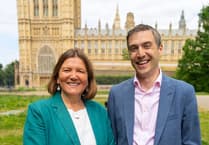THE discovery of a remarkable archive of old documents, including letters, scrapbooks and manuscripts, is shining a new light on the life of the famous county poet and First World War soldier F W Harvey.
The hoard of papers has already created a stir among members of the Forest-based F W Harvey Society.
Now members of the family have decided the collection should be preserved and made accessible to researchers at Gloucestershire Archives. The cataloguing – described as a mammoth task – will be made possible through a post graduate scholarship awarded by Exeter University.
The decision has been widely welcomed and particularly so by the Harvey Society.
Chairman Roger Deeks said: "This is a wonderful development that will awaken interest in F W Harvey and stimulate awareness of the important developments in music and literature that took place in Gloucestershire. The archive is a fabulous testament to an exceptional man who lived through extraordinary times. We are thrilled at the commitment of Exeter University and Gloucestershire Archives."
The collection was tucked away in cupboards, boxes and drawers in F W Harvey's Yorkley home and was not discovered until after the death of his son, Patrick.
The collection ranges from original school text books, bearing the stamps of a German censor, in which Harvey wrote the first drafts of his prison penned poems, to lifelong correspondence with old comrades, among them his best friend, the Gloucester poet Ivor Gurney.
Other items include Harvey's work at the BBC and correspondence with a range of figures such as John Masefield, Peter Scott and Wilfred Pickles.
The archiving project will be launched at a special event at King's School, Gloucester, on Saturday, October 27 (9.30am to 1pm). Members of the public are welcome.
The launch will include a talk by David Evans, deputy head at King's School, relating to the school between 1890 and 1920. There will also be an overview of Harvey's career at the BBC and a narrated presentation of Harvey's play Gunter's Farm broadcast by the BBC in 1937. There will be a reading of a selection of work in dialect.




